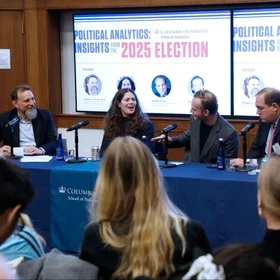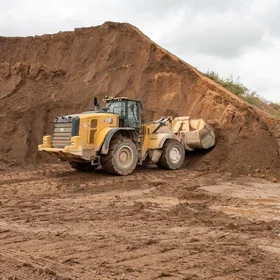“Humankind has never before had to deal with something so all-encompassing.”
This assertion starkly bookended the conversation in "Sustainability Post-COVID-19: Designing and Building for the Future," an August 11 webinar and virtual networking event hosted by the M.S. in Construction Administration program and WSP Global.
Quoting directly from the introduction to the Columbia University Task Force on Climate report, delivered in December 2019, the event moderator, John Parkinson, Lecturer in Discipline for the Construction Administration program, used the statement at the open and close of the discussion, underscoring both the enormity of the climate crisis and the dire need for action.
“That’s what we’re here to take on today,” he said. “This is not waiting for some mystical period of time in the future. We’re in that present now.”
Although the global pandemic compounds many of the challenges already facing efforts to “decarbonize the built environment,” it also accentuates many of the opportunities for change, prompting participants to invoke Winston Churchill’s famous aphorism: “Never let a good crisis go to waste.”
Indeed, the pandemic has motivated many institutions to adopt sustainability-minded measures, including transitioning to remote work and discouraging long-distance travel. At the same time, individuals are more cognizant of the conditions of their built environment.
“I love the fact that people are learning a lot more about how ventilation happens in buildings,” said WSP’s Narada Golden, Vice President of the consulting firm’s Built Ecology Practice and a lecturer in the Construction Administration program.
Gonzalo Covarrubias, Country Manager, WSP Peru, noted that COVID-19 may show how “fragile” we are but “also how easy it could be to adapt.”
While technology, including applied analytics and automation, will be “an important lever,” added Erika Duran, Senior Sustainability Consultant at WSP and a lecturer in the CADM program, it isn't the "silver bullet." "Technology can’t be the main solution," she said. We need people to comprehend and push solutions.”
All agreed that progress on decarbonization depends on aligning solutions at every scale, from individual choices to institutional action to government commitment.
“What keeps me up at night is the patchwork of local and state and national policies that make it so difficult to have an aligned response to the issue,” said Joshua Radoff, Senior Vice President, Built Ecology Practice, WSP.
Both Covarrubias and Golden emphasized the need for a broader spectrum of skills and stakeholders beyond engineering and other traditional disciplines in design and construction.
“The needs and skills required in our industry are expanding,” Golden said. “I see one of the important skill sets is the ability to listen and facilitate and incorporate broader types of feedback into the way we think about designing the built environment.”
Asked what role Columbia might play in the effort, Golden noted that the combination of scale and the shared commitment of the administration, students and other constituents made college campuses “uniquely positioned” to marshal solutions for sustainability.
“I think, simply put, universities are able to address and provide almost every solution for a zero-carbon future that you can imagine,” he said.
Watch the entire conversation below and learn more about the M.S. in Construction Administration program.



